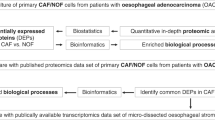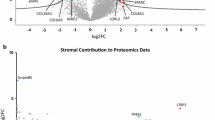Abstract
Objective
Cancer-associated fibroblasts (CAFs) are one of the hallmarks of the cancer microenvironment. Recent evidence has indicated that CAFs are more competent in enhancing cancer cell growth and migration than normal fibroblasts. However, the unique protein expression of CAFs has not been fully elucidated. This study aims to investigate the characterizations of colon CAFs by comparing the differential protein expression between CAFs and normal fibroblasts.
Methods
Primary fibroblasts were isolated from surgical specimen of human colon cancer and matched normal colonic tissue. Purity of the cell population was verified through immunostain analysis. Total cell lysates and conditioned media from each group of cells were extracted, and protein expression analysis was conducted using the surface-enhanced laser desorption/ionization time-of-flight mass spectrometry (SELDI-TOF-MS) ProteinChip platform.
Results
Most primary cells showed typical fibroblast-like features after two weeks. Increased proportion of α-smooth muscle actin-positive myofibroblasts was detected within the CAFs in four of the six pairs of primary cells. Fibroblast activation protein was weakly expressed in most cells without differences. Using SELDI-TOF-MS ProteinChip platform, four protein peaks mass over charge ratio (m/z) 1142, 3011, 4035, and 4945 were detected in the total cell lysates, and two protein peaks m/z 1368 and 1389 were detected in the conditioned media. The potential candidate proteins found in the Swiss-Prot database include morphogenetic neuropeptides, FMRFamide-related peptides, insulin-like growth factor II, thymosin β-4-like protein 3, and tight junction-associated protein 1.
Conclusions
Using the SELDI-ProteinChip platform, differential protein expressions were identified in colon CAFs compared with normal colonic stromal fibroblasts. The complex proteomic alternations in colon CAFs may play important roles related to the colon cancer microenvironment.
Similar content being viewed by others
References
Aaltonen, L.A., Hamilton, S.R., World Health Organization and International Agency for Research on Cancer, 2000. Pathology and Genetics of Tumours of the Digestive System. IARC Press, Lyon; Oxford University Press (Distributor), Oxford.
Allinen, M., Beroukhim, R., Cai, L., Brennan, C., Lahti-Domenici, J., Huang, H., Porter, D., Hu, M., Chin, L., Richardson, A., et al., 2004. Molecular characterization of the tumor microenvironment in breast cancer. Cancer Cell, 6(1):17–32. [doi:10.1016/j.ccr.2004.06.010]
Almholt, K., Johnsen, M., 2003. Stromal cell involvement in cancer. Recent Results Cancer Res., 162:31–42. [doi:10.1007/978-3-642-59349-9_3]
Bauer, M., Su, G., Casper, C., He, R., Rehrauer, W., Friedl, A., 2010. Heterogeneity of gene expression in stromal fibroblasts of human breast carcinomas and normal breast. Oncogene, 29(12):1732–1740. [doi:10.1038/onc.2009.463]
Bhowmick, N.A., Neilson, E.G., Moses, H.L., 2004. Stromal fibroblasts in cancer initiation and progression. Nature, 432(7015):332–337. [doi:10.1038/nature03096]
Brenmoehl, J., Miller, S.N., Hofmann, C., Vogl, D., Falk, W., Schölmerich, J., Rogler, G., 2009. Transforming growth factor-β 1 induces intestinal myofibroblast differentiation and modulates their migration. World J. Gastroenterol., 15(12):1431–1442. [doi:10.3748/wjg.15.1431]
Chen, Y.D., Zheng, S., Yu, J.K., Hu, X., 2004. Artificial neural networks analysis of surface-enhanced laser desorption/ionization mass spectra of serum protein pattern distinguishes colorectal cancer from healthy population. Clin. Cancer Res., 10(24):8380–8385. [doi:10.1158/1078-0432.CCR-1162-03]
Enkelmann, A., Heinzelmann, J., von Eggeling, F., Walter, M., Berndt, A., Wunderlich, H., Junker, K., 2011. Specific protein and miRNA patterns characterise tumour-associated fibroblasts in bladder cancer. J. Cancer Res. Clin. Oncol., 137(5):751–759. [doi:10.1007/s00432-010-0932-6]
Facchetti, F., Lonardi, S., Gentili, F., Bercich, L., Falchetti, M., Tardanico, R., Baronchelli, C., Lucini, L., Santin, A., Murer, B., 2007. Claudin 4 identifies a wide spectrum of epithelial neoplasms and represents a very useful marker for carcinoma versus mesothelioma diagnosis in pleural and peritoneal biopsies and effusions. Virchows Arch., 451(3):669–680. [doi:10.1007/s00428-007-0448-x]
Ge, Z., Zhu, Y.L., Zhong, X., Yu, J.K., Zheng, S., 2008. Discovering differential protein expression caused by CagA-induced ERK pathway activation in AGS cells using the SELDI-ProteinChip platform. World J. Gastroenterol., 14(4):554–562. [doi:10.3748/wjg.14.554]
Henriksson, M.L., Edin, S., Dahlin, A.M., Oldenborg, P.A., Oberg, A., van Guelpen, B., Rutegard, J., Stenling, R., Palmqvist, R., 2011. Colorectal cancer cells activate adjacent fibroblasts resulting in FGF1/FGFR3 signaling and increased invasion. Am. J. Pathol., 178(3): 1387–1394. [doi:10.1016/j.ajpath.2010.12.008]
Jayagopal, A., Yang, J.L., Haselton, F.R., Chang, M.S., 2011. Tight junction-associated signaling pathways modulate cell proliferation in uveal melanoma. Invest. Ophthalmol. Vis. Sci., 52(1):588–593. [doi:10.1167/iovs.10-5746]
Kumar, N., Maurya, P., Gammell, P., Dowling, P., Clynes, M., Meleady, P., 2008. Proteomic profiling of secreted proteins from CHO cells using surface-enhanced laser desorption ionization time-of-flight mass spectrometry. Biotechnol. Prog., 24(1):273–278. [doi:10.1021/bp070244o]
Melle, C., Ernst, G., Schimmel, B., Bleul, A., Mothes, H., Kaufmann, R., Settmacher, U., von Eggeling, F., 2006. Different expression of calgizzarin (S100A11) in normal colonic epithelium, adenoma and colorectal carcinoma. Int. J. Oncol., 28(1):195–200.
Mueller, L., Goumas, F.A., Affeldt, M., Sandtner, S., Gehling, U.M., Brilloff, S., Walter, J., Karnatz, N., Lamszus, K., Rogiers, X., et al., 2007. Stromal fibroblasts in colorectal liver metastases originate from resident fibroblasts and generate an inflammatory microenvironment. Am. J. Pathol., 171(5):1608–1618. [doi:10.2353/ajpath.2007.060661]
Nakagawa, H., Liyanarachchi, S., Davuluri, R.V., Auer, H., Martin, E.W.Jr., de la Chapelle, A., Frankel, W.L., 2004. Role of cancer-associated stromal fibroblasts in metastatic colon cancer to the liver and their expression profiles. Oncogene, 23(44):7366–7367. [doi:10.1038/sj.onc.1208013]
Orimo, A., Gupta, P.B., Sgroi, D.C., Arenzana-Seisdedos, F., Delaunay, T., Naeem, R., Carey, V.J., Richardson, A.L., Weinberg, R.A., 2005. Stromal fibroblasts present in invasive human breast carcinomas promote tumor growth and angiogenesis through elevated SDF-1/CXCL12 secretion. Cell, 121(3):335–348.[doi:10.1016/j.cell.2005.02.034]
Sugimoto, H., Mundel, T.M., Kieran, M.W., Kalluri, R., 2006. Identification of fibroblast heterogeneity in the tumor microenvironment. Cancer Biol. Ther., 5(12):1640–1646. [doi:10.4161/cbt.5.12.3354]
Xu, W.H., Chen, Y.D., Hu, Y., Yu, J.K., Wu, X.G., Jiang, T.J., Zheng, S., Zhang, S.Z., 2006. Preoperatively molecular staging with CM10 ProteinChip and SELDI-TOF-MS for colorectal cancer patients. J. Zhejiang Univ.-Sci. B, 7(3): 235–240. [doi:10.1631/jzus.2006.B0235]
Author information
Authors and Affiliations
Corresponding author
Additional information
The two authors contributed equally to this work
Project supported by the National Natural Science Foundation of China (Nos. 81000892, 81071801, and 30801341) and the Research Fund for the Doctoral Program of Higher Education of China (No. 200803351107)
Rights and permissions
About this article
Cite this article
Wang, Zh., Ding, Kf., Yu, Jk. et al. Proteomic analysis of primary colon cancer-associated fibroblasts using the SELDI-ProteinChip platform. J. Zhejiang Univ. Sci. B 13, 159–167 (2012). https://doi.org/10.1631/jzus.B1100266
Received:
Accepted:
Published:
Issue Date:
DOI: https://doi.org/10.1631/jzus.B1100266
Key words
- Colon cancer
- Cancer microenvironment
- Cancer-associated fibroblasts
- Proteomics
- Surface-enhanced laser desorption/ionization time-of-flight mass spectrometry (SELDI-TOF-MS)




